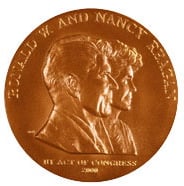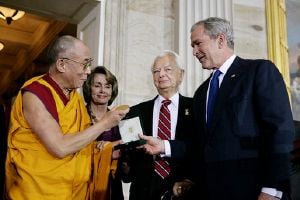Congressional Gold Medal


A Congressional Gold Medal is an award bestowed by the United States Congress and is, along with the Presidential Medal of Freedom, the highest civilian award in the United States. The decoration is awarded to an individual who performs an outstanding deed or act of service to the security, prosperity, and national interest of the United States. American citizenship is not a requirement.
The Gold Medal and the Presidential Medal of Freedom are generally considered to carry the same level of prestige (though significantly fewer Gold Medals have been awarded). The chief difference between the two is that the Medal of Freedom is personally awarded by the President of the United States (executive branch), and Congressional Gold Medals are awarded by acts of the Congress (legislative branch).
Per committee rules, legislation bestowing a Congressional Gold Medal upon a recipient must be co-sponsored by two-thirds of the membership of both the House of Representatives and the Senate before their respective committees will consider it.
A Congressional Gold Medal is a completely separate decoration from the Medal of Honor, which is a military award for extreme bravery in action. Another similarly named decoration is the Congressional Space Medal of Honor, presented by NASA for extraordinary accomplishment to the mission of United States space exploration.
History
The Continental Congress had not yet proclaimed its independence form Great Britain when, on March 25, 1776, George Washington, commander of the Continental Army, was tendered the first Congressional Gold Medal for his “wise and spirited conduct” in bringing about British evacuation of Boston. During the next 12 years, the Continental Congress authorized an additional six gold medals for Revolutionary military and naval leaders.
In 1777, Major General Horatio Gates was recognized for his “brave and successful efforts” in bringing about the surrender of the British Army at Saratoga. Two years later, a similar honor was bestowed upon Major General Anthony Wayne in 1779 for his courageous assault on the British at Stony Point, New York. A gold medal was also given to Major Henry Lee in commemoration of the skill and bravery he exhibited against the British at Paulus Hook, New Jersey. Brigadier General Daniel Morgan and Major General Nathaniel Greene were praised for their gallant efforts in South Carolina during 1781. Six years later, John Paul Jones was similarly honored for his “valor and brilliant services” in capturing the Serapis.[1]
Since the American Revolution, Congress has commissioned gold medals as its highest expression of national appreciation for distinguished achievements and contributions. Each medal honors a particular individual, institution, or event. Although the first recipients included citizens who participated in the American Revolution, the War of 1812 and the Mexican-American War, Congress broadened the scope of the medal to include actors, authors, entertainers, musicians, pioneers in aeronautics and space, explorers, lifesavers, notables in science and medicine, athletes, humanitarians, public servants, and foreign recipients.[2] The medal was first awarded in 1776 by the Second Continental Congress to then-General George Washington during the American Revolutionary War.[3] The medal has been awarded three times in its history; to Admiral Hyman Rickover, Lincoln Ellsworth, and Martin Luther King, Jr.
Design
A Congressional Gold Medal is created by the United States Mint to specifically commemorate the person and achievement for which the medal is awarded. Each medal is therefore different in appearance, and there is no standard design for a Congressional Gold Medal. Congressional Gold Medals are also considered "non-portable", meaning that they are not meant to be worn on a uniform or other clothing, but rather displayed much like a trophy. Often, bronze versions of the medals are struck for sale.
Among the award’s non-American recipients are Nelson Mandela, Mother Teresa, British Prime Minister Winston Churchill, British Prime Minister Tony Blair and former Russian dissident and Israeli Cabinet member Natan Sharansky.
Notes
- ↑ CRS Report for Congress Senate.gov. Retrieved January 25, 2009.
- ↑ Congressional Gold Medal Recipients
- ↑ Dalai Lama Receives Congressional Gold Medal.
ReferencesISBN links support NWE through referral fees
- Stathis, Stephen W. 2002. Congressional Gold Medals, 1776-2002. New York: Novinka Books. ISBN 1590335147
External links
- CRS Report for Congress Senate.gov.
- List of recipients
Credits
New World Encyclopedia writers and editors rewrote and completed the Wikipedia article in accordance with New World Encyclopedia standards. This article abides by terms of the Creative Commons CC-by-sa 3.0 License (CC-by-sa), which may be used and disseminated with proper attribution. Credit is due under the terms of this license that can reference both the New World Encyclopedia contributors and the selfless volunteer contributors of the Wikimedia Foundation. To cite this article click here for a list of acceptable citing formats.The history of earlier contributions by wikipedians is accessible to researchers here:
The history of this article since it was imported to New World Encyclopedia:
Note: Some restrictions may apply to use of individual images which are separately licensed.